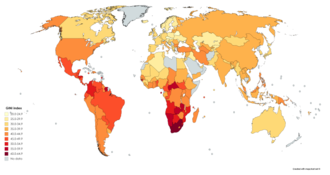Economic inequality

Economic inequality is the disparities in people's incomes and wealth. It affects standard of living for different socioeconomic classes in a given country, as how high one's income is often dictates what they can eat and how often they can eat, what type of dwelling they can live in (to the point of becoming homeless sometimes), quality of medical care etc. Government policies to alleviate such inequality, especially by alleviating poverty, or at least trying to alleviate it, can include redistribution of income and wealth, universal healthcare, welfare, universal basic income, increasing or decreasing business regulations, etc.
Income inequality is when some people get far more income than other people. As of 2018, the countries of Scandinavia in northern Europe have some of the lowest levels of income inequality. Incomes are more unequal in the United States and even more so in the countries of southern Africa.[1]
Both wealth and income inequality can be measured by the Gini coefficient.
Economic Inequality Media
Global share of wealth by wealth group, Credit Suisse, 2021
Countries' income inequality according to their most recent reported Gini index values as of 2018.
Countries by the inequality-adjusted Human Development Index.
"Elephant curve": Change in real income between 1988 and 2008 at various income percentiles of global income distribution.
The gender gap in median earnings of full-time employees according to the OECD 2015
Related pages
References
- ↑ 1.0 1.1 "GINI index (World Bank estimate) | Data". World Bank. Archived from the original on 1 August 2018. Retrieved 30 January 2023.









